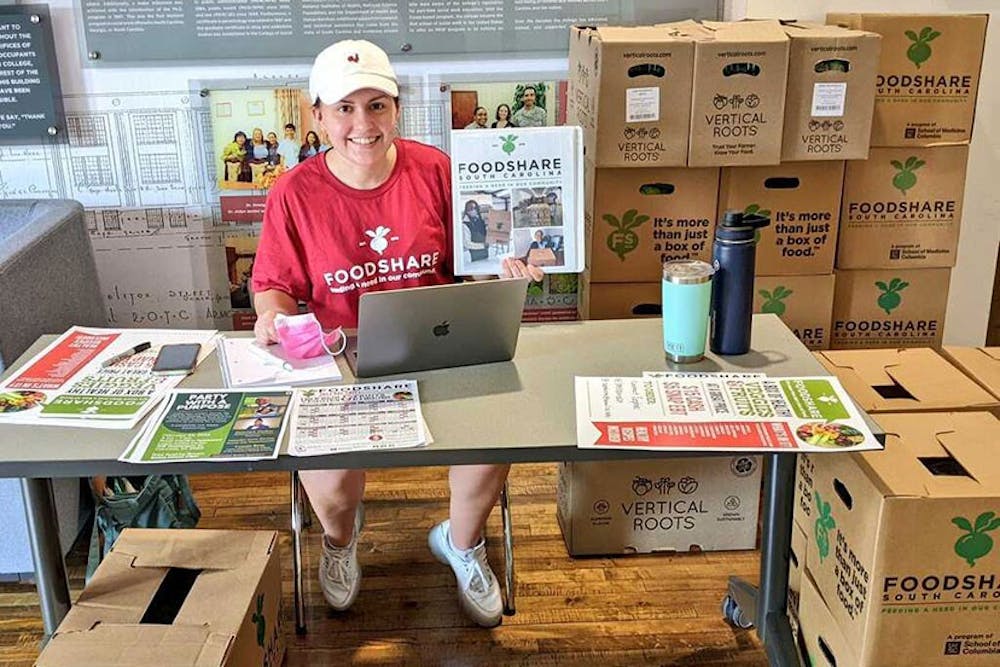On Feb. 23 Hamilton College turned into a grocery store for the day.
Sophie Crosby, a fourth-year student at USC, acted as grocer while the building's lobby was the storage area for boxes of prepackaged produce. A classroom desk was her check-out counter. From behind the counter, Crosby supplied customers with boxes of fresh produce in exchange for SNAP, EBT or cash.
The boxes and distribution sites like this "grocery" store are the cornerstone of a program called FoodShare, a USC School of Medicine initiative to increase access to fresh food across the state.
Crosby, an exercise science major, brought the program to campus as a way to build her Honors College senior thesis while addressing the issue of food insecurity among college students. Feb. 23 was the first day that any USC student, faculty or staff member could use the program and pick up their box on campus.
“I just thought, what way could I expand my work with FoodShare? And then I learned that food insecurity on college campuses is such a big issue and how many people it affects,” Crosby said. “And I just thought, well, this is something that's really awesome that's already a part of the Columbia community. Why not try to get it on campus?”
The need for fresh food exists on campus, Iris Gadsden, FoodShare program assistant, said. College students often lack the funds necessary to support healthy eating behavior.
“We know that any and everyone can be impacted by food insecurity — but especially those who are in such big transition periods like college students,” Gadsden said. “We understand that a lot of college students are pursuing higher ed on their own. They're pursuing higher ed without the financial support of their families or without the financial support of their communities.”
FoodShare provides boxes of fresh produce at affordable prices. The small box — perfectly sized for college students — costs $15 or $5 with SNAP or EBT benefits.
FoodShare boxes contain 15 pounds of fresh produce, most of which is locally grown. The inaugural batch of USC boxes included: potatoes, apples, oranges, bananas, a cantaloupe, green bell peppers, a cauliflower and a cabbage.
“We can't grow bananas in Columbia, but if it's something that we can get within South Carolina, we do our best to do so,” Crosby said.
FoodShare is able to keep costs low through the work of volunteers. According to Gordon Schell, the associate director of FoodShare, Crosby’s determination was ultimately what brought FoodShare to USC.
“Sophie started volunteering with us, helping us to pack the boxes and helping us to distribute boxes, and she became really interested and aware, really interested and committed to what we were all about,” Schell said.
Consistent volunteers drive much of FoodShare’s work, helping deliver 500 boxes every other week throughout the Midlands.
Crosby said that the produce gets packed by a team of volunteers on Tuesday mornings at the State Farmers Market in West Columbia. It is then trucked over to FoodShare's headquarters on the northeast side of Columbia.
“Distribution goes out to different partner sites like us. Individuals can come to pick up their boxes, neighbor share drivers come and take boxes to people who don't have access to transportation,” Crosby said.
FoodShare was first introduced to combat hunger and food insecurity in South Carolina; it currently serves 18 counties throughout the state. Crosby, along with her thesis advisor Dr. Maryah Fram, pitched to include USC in the FoodShare expansion at a Columbia Food Policy Committee meeting.
Committee member and USC SNAP-Ed program coordinator Ashley Page Bookhart is focused on addressing food insecurity across Columbia area colleges. She was impressed after Crosby and Fram presented at the Committee meeting and wanted to see how FoodShare could grow.
“We're really interested in this FoodShare concept. Now we're looking at trying to do this on a larger scale,” Bookhart said. “We're not only (wondering) 'Hey, can you get FoodShare on campus,' but also how can you tweak FoodShare and make sure it's relevant to college students amongst all of those campuses.”
FoodShare itself is growing. Gadsden said their Columbia Mall headquarters are currently under construction. The new builds will include a state-of-the-art kitchen and community spaces to provide cooking classes.
The expansion to USC is the organization’s first foray onto a college campus, but it won’t be the last, Schell said. Schell and Bookhart both want to see FoodShare expand past USC to Columbia College, Allen University and Benedict College. This goal requires finding a home for FoodShare at each school.
“Just increasing that awareness of being able to find a place on campus — a department or a student club — or someone like Sophie who was able to identify a way to get it to work at Carolina,” Schell said. “How can we get this to work at these other campuses that also have students who are in need — which we know is all of them.”

